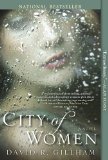Book Club Discussion Questions
In a book club? Subscribe to our Book Club Newsletter!
For supplemental discussion material see our Beyond the Book article, The Bombing of Berlin and our BookBrowse Review of City of Women.
Please be aware that this discussion guide will contain spoilers!
- Why do you think Sigrid helps Ericha at the cinema in the opening of the book? If you had been in Sigrid’s situation, would you have helped Ericha? Would you have become as involved as Sigrid does? With the advantage of hindsight, our perspective is no doubt skewed; since we know the truth behind what was happening in Nazi Germany, how do our answers compare with Sigrid’s bold decisions?
- As the story progresses, Sigrid grows more and more involved and takes more and more risks. How does her reasoning for doing so later differ from the reasoning behind her first risky decision in the cinema? What is her motivation for making these increasingly dangerous choices? Desire? Excitement? Conscience?
- Discuss the theme of betrayal in City of Women. Many of the characters are guilty of double–crossing and treachery. In what ways do they deceive one another? What about Egon? Is his betrayal portrayed differently from that of others, such as Renate or Ericha?
- Sigrid’s relationships are numerous and varied—with her mother–in–law, her neighbors, her coworkers, her husband, her lovers, the so–called U–boats. How does each of them define who Sigrid is? How is she reflected in the various relationships? How have these bonds been altered by the extraordinary circumstances of war?
- Were you surprised by the depiction of Berlin during World War II? Before reading the novel, had you thought about what life was like on the German home front as the tide turned and defeat loomed on the horizon?
- Countless times throughout the novel, characters risk their lives to help others—to protect the value of human life, spurred on by their own integrity. Conversely, there is the scene on the bus where no one does anything as a Jewish woman is arrested and brutalized. Which do you think is typical of human behavior? Are people more inclined to avert their eyes and try to stay out of trouble, or risk their own safety and get involved? Why?
- If one simply observes the facts at surface value, Sigrid would probably not be considered a righteously moral individual. Nonetheless, she manages to be a very sympathetic character. How does the author accomplish this?
- Sigrid’s coworker Renate seems to have a sensibility similar to hers. Yet when Renate discovers that Sigrid’s lover may be Jewish, her response shocks Sigrid. Was it naive of Sigrid to expect anything different? Were you surprised by how deep–seated Renate’s anti–Semitism was?
- Often in the novel, people are not actually who they appear to be. Consider Frau Obersturmführer Junger, the SS officer’s pregnant wife who moves in down the hall: were you shocked to find out her secret? Do you feel that everyone in the book is hiding something?
- How would you characterize Sigrid’s relationship with Ericha Kohl? Antagonistic? Trusting? Maternal? What do you think Sigrid gets from her relationship with Ericha? What does Ericha get from Sigrid?
- What did you think about Kaspar? Egon? Wolfram? All are on the wrong side of history. Did you find any of them appealing? Are they very different from one another?
- At one point Sigrid flirts with the idea of turning in Anna Weiss and her two daughters so that she can have Egon to herself. Do you feel she seriously considers this?
- How important is amorous passion in the novel? Is that the driving force that motivates Sigrid? Is it emblematic of something else?
Unless otherwise stated, this discussion guide is reprinted with the permission of Berkley Books.
Any page references refer to a USA edition of the book, usually the trade paperback version, and may vary in other editions.
